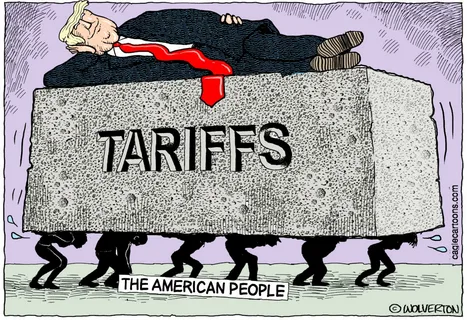The tariff shock is now reshaping the global economic order, and the poorest nations are left carrying the great burden. Beginning in April 2025, the United States began implementing the massive tariff policy with disastrous effects on the development of economies. With tariffs surging from 10% to above 25% by July 2025 for a number of nations. This Tariff Shocks has created a very high cost of trade, particularly for Least Developed Countries (LDCs).
The United Nations Conference on Trade and Development (UNCTAD) alerts that for many of these vulnerable countries, trade costs might triple because of a tariff shock; thus extinguishing export possibilities and increasing inequalities. Ranging from textiles to agriculture, the tariff shock is going further into profits and slamming the brakes on the economic momentum across the Global South.
Read More: Tariff-Free Zones Surge Amid Trump’s Trade War Moves
Tariff Shock Hits LDCs Hardest
The tariff shocks does not apply equally: it most brutally punishes the already vulnerable. UNCTAD reports that tariffs for LDCs are now rising from 16% and up to possibly 44% by July. For several small island states and developing nations in Asia and Oceania, the costs have escalated dramatically, with tariff shock moving their rates from 13% to 24%. The Latin American and Caribbean countries, once almost free from tariffs, are now set to increase over 13%.
The accelerating tariffs for purposes of national economic security are ruining the lives of those less involved in creating the global trade imbalances. Tariff shock applies to countries that hold no major political tensions with the US. Hence a truly universal disruption for the developing world.
Key Sectors Crushed by Tariff Shock
For agriculture and textile industries among the important sectors of the developing world, the tariff shock has been devastating. These sectors employ huge numbers of persons and are vital for LDCs’ economic stability. With the rising tariff levels, many exporters can no longer afford to compete in the global market. The tariff shock has been slicing profit margins, raising operational cost levels, and dampening interest in investment. Even prior to the tariff shock, countries with no recent history of trade surpluses or policy disputes with the US were being hit with these punitive charges. For many small economies, this tariff shock also means decreased GDP, widespread job losses, and greater dependency on aid.
Also Read: Al Ain Farms Group Merger Transforms UAE Food Landscape
Global Ripple Effects of the Tariff Shock
Tariff shock effects extend beyond national borders. The International Trade Centre estimates this aggressive tariff regime could reduce world trade by about 7% and cut global GDP by 0.7%. The World Bank, however, estimates that tariff shock may push up to 50 million people into poverty by the year 2030. The effect is felt the hardest in countries still working through the economic aftershocks of the pandemic. Although they allegedly account for only 0.3% of the US trade deficit, developing countries have borne a disproportionate cost. But tariff shock is doing more than raising costs-it is disrupting decades of development efforts and endangering the future of millions.
What Needs to Change: Urgent Calls for Action
UNCTAD emphasizes that immediate global action must be taken to mitigate the damage caused by the tariff shock. Proposed recommendations include an exemption for the most vulnerable nations, expedited customs procedures. Economic diversification to mitigate overdependence on few export sectors. Policymakers are called upon to make informed decisions using such tools as UNCTAD’s interactive trade data and regional forecasts. Without some strategic interventions, the tariff shock could permanently undermine. The economic foundation of dozens of countries and perilously lock them into cycles of poverty and trade isolation.
As this tariff shock spreads across borders and economies, it quickly becomes apparent that trade cannot survive on protectionism alone. If the rules of engagement are rewritten without consideration for the smallest players. It puts the world at risk for sanctions against the interest of millions. Tariff shock must not be allowed at any costs to become the latest episode in the long story of unequal trade.
For More Trending Business News, Follow Us 10xtimes News






